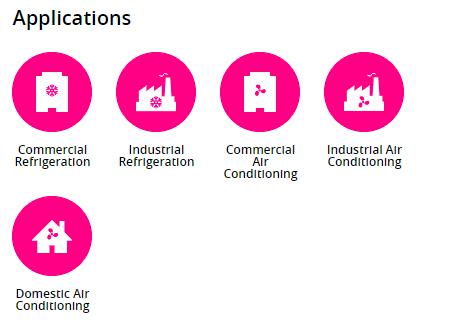R290 (Propane) is refrigerant grade propane, used as an alternative to R404A and R407 series refrigerants in new refrigeration and
Air Conditioning systems. R290 (Propane) is a Hydrocarbon and although highly flammable it is an efficient refrigerant that has a low Global Warming Potential (GWP).

R290 (propane) can also be used as a substitute refrigerant. Being an organic compound (hydrocarbon), it has no ozone depletion potential and a negligible direct global warming effect. To take into consideration however, is a certain contribution to summer smog.
Pressure levels and refrigerating capacity are similar to R22, and its temperature behaviour is as favourable as with R134a.
There are no particular problems with materials. In contrast to NH3, copper materials are suitable as well, so that it can be used in semi-hermetic and hermetic compressors. Common mineral oils of HCFC systems can be used here as a lubricant over a wide application range. Polyol esters (POE) and polyalpha olefins (PAO) offer even more favorable properties.
Refrigeration plants with R290 have been in operation world-wide for many years, mainly in industry – it is a "proven" refrigerant.
Meanwhile R290 is also used in smaller compact systems with low refrigerant charges like residential air-conditioning units and heat pumps. Furthermore, a rising trend can be observed in its use with commercial refrigeration systems and chillers.
Propane is offered also as a mixture with isobutane (R600a) or ethane (R170), in order to provide a performance similar to halocarbon refrigerants. Pure isobutane is mostly intended as a substitute for R12 in small systems (preferably domestic refrigerators and freezers).
The disadvantage of hydrocarbons is their high flammability, therefore they are classified as refrigerants of safety group A3. Based on the refrigerant charges commonly used in commercial systems, the system design and risk analysis must be in accordance with explosion protection regulations.
Semi-hermetic compressors in so-called "hermetically sealed" systems are in this case subject to regulations for hazardous zone 2 (only seldom and short term risk). Safety demands include special devices to protect against excess pressures and special arrangements for the electrical system. In addition, measures are required to ensure hazard free ventilation to effectively prevent a flammable gas mixture in case of refrigerant leakage.
Design requirements are defined by standards (e.g. EN378) and may vary in different countries. For systems applied in the EU, an assessment according to EC Directive 94/9/EC (ATEX) may become necessary as well. With open compressors, this will possibly lead to a classification in zone 1 ‒ which demands, however, electrical equipment in special flame-proof design.
R600a (Iso-Butane) is refrigerant grade Iso-Butane used as a replacement for R12 and R134a in a variety of high temperature refrigeration applications. R600a (Iso-Butane) is a hydrocarbon that is becoming increasingly popular due to its low Global Warming Potential (GWP). It is the refrigerant of choice for domestic and light commercial refrigeration units, including fridges and freezers, drink dispensers and stand alone display units.
WARNING: Hydrocarbon refrigerants are flammable and must be handled in a safe and responsible manner by properly qualified, trained and experienced technicians.
The restrictions on cooling fluids which contribute to global warming (the case of HFCs,
From the environmental point of view, hydrocarbons are excellent options: it do not harm the ozone layer and with a practically zero impact on global warming.
To finish, regarding the technical aspect, it have a very good performance, compared with other options of cooling fluids.
For all these reasons, Embraco considers it to be an excellent alternative and has dedicated itself to R&D of refrigeration solutions which incorporate them.
Besides following the good practices of preventive and corrective maintenance, it is necessary to be attentive to certain aspects in which they are different, for example, than HCFCs or HFCs.
As R600a and R290 are inflammable, differentiated procedures must be adopted in the case of welding piping. In these situations, it is essential to certify that the piping is totally exempt of isobutane or propane.
The blowtorch must only be used after this, not to have risks. An essential measure for safety is to pass a load of nitrogen in the piping, to leave it without remains of gas.
In October, a global agreement was signed to reduce the use of HFCs (hydrofluorocarbons). Approximately 200 countries agreed to establish restrictions on the use of these substances, which have been used as replacements of CFCs. The reason for these restrictions is the negative impact that they cause in terms of global warming.
The decision was taken at a meeting in Kigali, in Ruanda, and it complements the Protocol of Montreal, which had great success in eliminating the consumption of gases harmful to the ozone layer. The concern is justified because the use of HFCs is increasing at a rate of 10% a year and the projections indicate that, if nothing is done, the demand will continue to grow.
A commitment was established so that the use of HFCs is reduced gradually. The reduction process begins with most developed countries, which in 2019 will need to reduce this use by 10%, compared with the volume consumed between 2011 and 2013. In these countries, by 2036, the reduction will have to be 85%.




